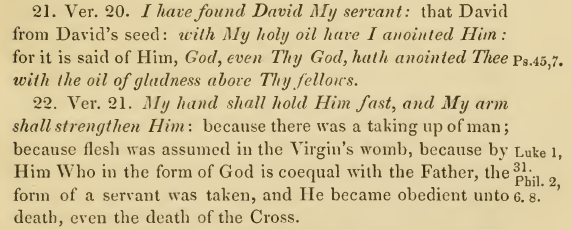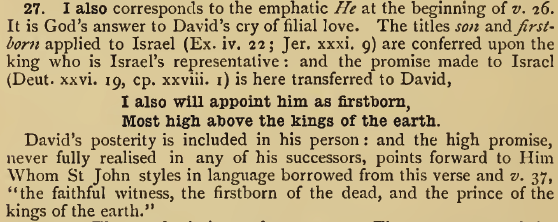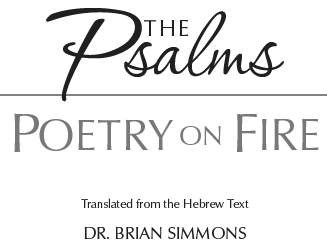Psalm 89.27 (28 in the Hebrew bible) reads:
אַף־אָ֭נִי בְּכֹ֣ור אֶתְּנֵ֑הוּ עֶ֝לְיֹ֗ון לְמַלְכֵי־אָֽרֶץ׃
Here are a few translations into English:
Also I will make him my firstborn, higher than the kings of the earth. [KJV]
I also will make him [my] first-born, The highest of the kings of the earth. ASV
And I will make him the first-born, the highest of the kings of the earth. RSV
“I also shall make him My firstborn, The highest of the kings of the earth. NASB
And I will appoint him to be my firstborn, the most exalted of the kings of the earth. NIV
Also I will make him my firstborn, The highest of the kings of the earth. NKJV
I will make him the firstborn, the highest of the kings of the earth. NRSV
And I will make him the firstborn, the highest of the kings of the earth. ESV
The differences between the translations are fairly minor. The NIV has ‘appoint’ rather than ‘make’. Several have ‘my first-born’ rather than ‘the first-born’, but all of these except the NIV mark ‘my’ with italics or square brackets to show that it is not in the original text. The KJV has ‘higher than’ the kings of the earth, rather than the ‘highest of’ the kings of the earth.
In Brian Simmons’ book ‘The Psalms: Poetry on Fire’, however, this verse has been changed into something very different:
I am setting him apart, favoring him as my firstborn son. I will make him like unto me, the most high king in all the earth!
According to Simmons, God seems to describe Himself as ‘the most high king in all the earth’, and say that He will make someone (‘him’) like Himself, particularly in this aspect of being the highest king in the earth. But who is this someone, in the original, and in Simmons’ version?
two traditions of interpretation
The passage from verse 19 to 37 has been variously interpreted to concern David King of Israel, or the Lord Jesus Christ, son of David. David is named in verse 20 (21):
מָ֭צָאתִי דָּוִ֣ד עַבְדִּ֑י בְּשֶׁ֖מֶן קָדְשִׁ֣י מְשַׁחְתִּֽיו׃
“I have found David My servant; With My holy oil I have anointed him, [NASB]
Personally, I prefer a more literal straightforward interpretation wherever possible, and would understand this to refer primarily to the anointing of David by Samuel (1 Samuel 16.13). But Augustine, for example, took this to refer to ‘that David from David’s seed’ and expounds the whole passage with reference to Christ only. For example, to explain the following verse:
אֲשֶׁ֣ר יָ֭דִי תִּכֹּ֣ון עִמֹּ֑ו אַף־זְרֹועִ֥י תְאַמְּצֶֽנּוּ׃
With whom My hand will be established; My arm also will strengthen him. [NASB]
which speaks of human weakness, Augustine points out that in the Incarnation the Lord Jesus did indeed assume human flesh and frailty:
More moderately, or so it seems to me at least, Spurgeon first expounds verse 20 with reference to David, and then continues that:
The verse must also be expounded of the Prince Emanuel
Of the section 89.19-37 as a whole, Matthew Henry says that some passages within it are:
scarcely applicable at all to David, but must be understood of Christ only
Even a commentator like Kirkpatrick, whose notes generally make reference to David the man, applies the ‘high promise’ of verse 27 also to the coming Son of David and Messiah of Israel:
Clearly, it is not the translator’s role to make any interpretative decisions, where they are not forced to do so.
The extent of david’s kingdom
Verse 25(26) reads:
וְשַׂמְתִּ֣י בַיָּ֣ם יָדֹ֑ו וּֽבַנְּהָרֹ֥ות יְמִינֹֽו׃
“I shall also set his hand on the sea And his right hand on the rivers. [NASB]
Many commentators take the reference to be to David’s kingdom, that it would extend from the Mediterranean on the West to the Euphrates on the North-East. Here is Kirkpatrick, for example, in the Cambridge Bible, 1895: 1
Delitzsch disagrees, arguing that the plural נהרות ‘rivers’, indicates that what is promised is:
world-wide dominion
rather than delimitation by a particular river, which would have been indicated by the word in the singular: 2
Augustine, needless to say, took this verse to refer to Christ’s future rule over the nations: 3
Spurgeon also took it of the Lord Jesus Christ: 4
Matthew Henry saw a fulfillment of the promise in David’s kingdom, but its ‘full accomplishment’ in the Kingdom of the Messiah:
I think the matter is quite finely balanced though, if pushed, I would be inclined to agree with Matthew Henry that God was speaking first about David’s kingdom, and then about the Messiah’s coming universal Kingdom on the earth. But the Lord knows.
I am appalled therefore that Brian Simmons does not translate this verse at all, but inserts interpretative commentary in the place of a translation, still in the name of a ‘translation’ of the holy and inspired scriptures:
David’s kingdom shall reach from the Mediterranean to the Euphrates River.
Here is the real scripture again:
וְשַׂמְתִּ֣י בַיָּ֣ם יָדֹ֑ו וּֽבַנְּהָרֹ֥ות יְמִינֹֽו׃
Let’s take this word by word and see what it says:
-
-
- וְשַׂמְתִּ֣י (weśamtî) has the waw conjunction וְ , which can suitably be rendered ‘also’ here, followed by the waqatal 1st person singular of שׂוּם , שִׂים (śîm, śûm), meaning ‘put’, ‘set’, ‘place’ (something in a location). Thus: ‘I will also set….’
- בַיָּ֣ם (ḇayyâm) is prefixed by the preposition בְּ (be), meaning ‘in’, combined with the article ּ הַ (ha + dagesh forte in first consonant of the noun to double it) to form ּ בַּ (ba), thus ‘in the’, the dagesh lene (the dot in the middle of the beth) being dropped, I think, because it follows the vowel yod in the previous word. יָם (yām) means ‘sea’, so בַיָּ֣ם means ‘in the sea’.
- יָדֹ֑ו (yāḏô) is יָד (yāḏ), meaning ‘hand’, followed by the third person singular masculine pronominal suffix וֹ (ô), meaning ‘his’. The metaphorical meanings of include ‘portion, range’ and ‘power’ (Holladay, 5.b, 5.c), so it is not hard to see that what is being expressed here is the extent of his dominion. So far we have ‘And I will also set – in the sea – his hand’, that is, in English, ‘I will also set his hand in the sea’.
- וּֽבַנְּהָרֹ֥ות (ûḇannhārôṯ) has the waw conjunction, ‘and’, followed by the beth preposition combined with the article, ‘in the’, followed by the plural of נָהָר (nāhār), meaning ‘river’. So, ‘and in the rivers’.
- יְמִינֹֽו (yemînô) is יָמִין (yāmîn), meaning ‘right (side)’, followed by the third person singular masculine pronominal suffix, meaning ‘his’. The lexical meanings of יָמִין include ‘right hand’ and ‘right side’.
-
Putting these five word together we have:
I will also set his hand in the sea, and his right hand in the rivers.
Here is the NASB again:
“I shall also set his hand on the sea And his right hand on the rivers. [NASB]
The HCSB translates with ‘power’:
I will extend his power to the sea and his right hand to the rivers.
but most other translations allow the reader to see the metaphor of one hand in the sea and one in the rivers, expressing either a universal or a more limited dominion:
I will set his hand also in the sea, and his right hand in the rivers. [KJV]
I will set his hand also on the sea, And his right hand on the rivers. [ASV]
I will set his hand over the sea, his right hand over the rivers. [NIV]
I will set his hand on the sea and his right hand on the rivers. [ESV]
Here, once again, is how Simmons renders this verse:
David’s kingdom shall reach from the Mediterranean to the Euphrates River.
Do you agree with me that what Simmons has written is not translation at all, but commentary and interpretation? With this text before him or her, it would be impossible for a reader to understand Spurgeon’s commentary, for example. They would be at a loss to understand why Spurgeon understands the verse to speak of Christ’s coming universal dominion, when it apparently speaks explicitly of David’s more limited rule. But this is not the true text. It is a lie, to speak frankly, to call this a ‘translation’ of the Hebrew original, as Brian Simmons does:
The psalm does not say that David’s kingdom would extend from the Mediterranean to the Euphrates river. That is one possible interpretation, among others, of what he did say.
Andrew
Notes:
- A. F. Kirkpatrick, ‘The Book of Psalms’, Vol. 2 (Cambridge: University Press, 1895) 538. ↩
- Delitzsch’s Commentary on the Psalms, Vol. 3 (Edinburgh: T & T Clark, 1885) 40 ↩
- Augustine, ‘Expositions on the Book of Psalms’ (Oxford: Parker, 1850) 254. ↩
- C. H. Spurgeon, ‘The Treasury of David’, Vol. 4 (London: Marshall) 30-31. ↩








